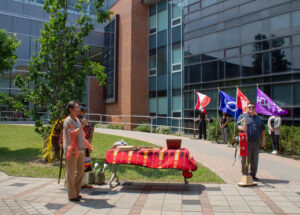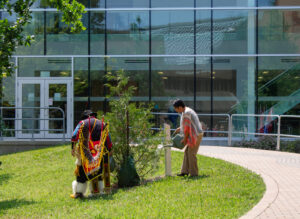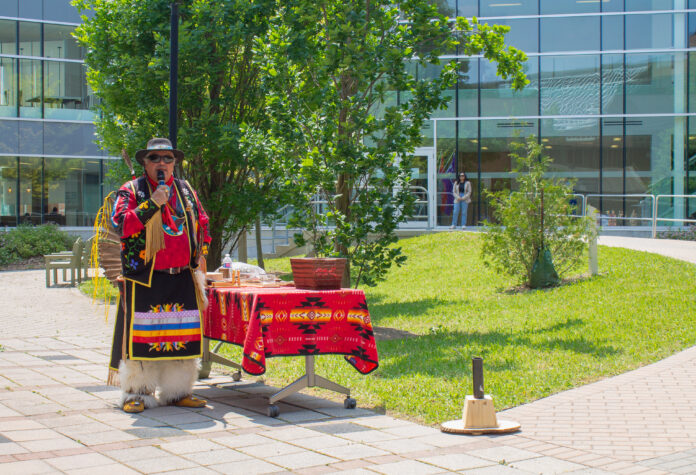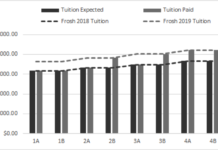On Tuesday, UW recommitted to reconciliation during the Polishing the Eagle Feather event which took place in the BC Matthews Hall courtyard.
The event was led by Elder Myeengun Henry of the Anishinaabeg tribe, the faculty of health’s Indigenous Knowledge Keeper and a currently elected band councillor. Henry explained the significance of recognizing the commitment the university made to reconciliation a year ago.
“Everything we consider to be sacred starts with ceremony,” Henry said. “Today we’re gonna commemorate that commitment by annually coming back and polishing the Eagle feather that is the symbol of this unity and the faculty of health creating opportunities within this faculty to the university.”
Multiple ceremonies took place, the first being the singing-in of the flags. Four flags were posted during Guando Day, a Mi’kmaq welcome song, and the Seven Grandfathers song: the purple Six Nations flag, the red Anishinaabeg flag, the blue Métis flag, and the flag of Canada. The latter, he explained, was brought in because Canada was built on the treaties between First Nations groups and settlers. “We have to remember those treaties and start establishing that renewal of honouring those treaties,” he said.
Another aspect of the ceremony was the eagle staff, which represents the warrior figure. “That’s another symbol of the eagle staff: one who fought to keep our culture alive and the right to speak our languages alive,” Henry said.
Faculty of health dean Lili Liu then made remarks which included a land declaration and reiteration of her appreciation towards Henry from whom she learned during one-on-one conversations and group learning circles.

“This is really just the beginning,” she said. Together, Liu and Henry watered the cedar tree that they planted last year, an action which Henry said “signifies more strength and nourishment that this relationship will always need to have.”

The ceremony ended with Henry and Liu sending ceremonial tobacco up to the Creator while more traditional music was performed to drum beats. During this time, event attendees turned to face every direction “to honour the four directions” where the tobacco was being sent. The flags and eagle staff were then closed to symbolize the ending of the ceremony.
“With the goodwill of our leadership, our president, our chancellor, we were able to make these things happen really fast,” Henry said. Some of these changes include tuition being waived for certain First Nations students, and the introduction of artwork and courses on campus that represent the Indigenous perspective both in the faculty of health and throughout the rest of UW. Henry cited President Vivek Goel as someone who “really was serious about these gestures of reconciliation,” and said he was the one who suggested bringing the eagle staff in front of the traditional mace during this year’s convocation ceremonies. Moving forward, Henry said that he hoped to eventually see an Indigenous knowledge-keeper for every faculty.
When asked what students can do to commit to reconciliation, Henry said to learn about Canada’s true history. “You don’t have to be Indigenous to know that Indigenous people created partnerships with the people who came here, and we have treaties that talk about how we’re gonna live going forward,” he said. “We kept our knowledge of keeping the water sacred, the air clean, and I think we can teach a lot of different people a better way of being.”































